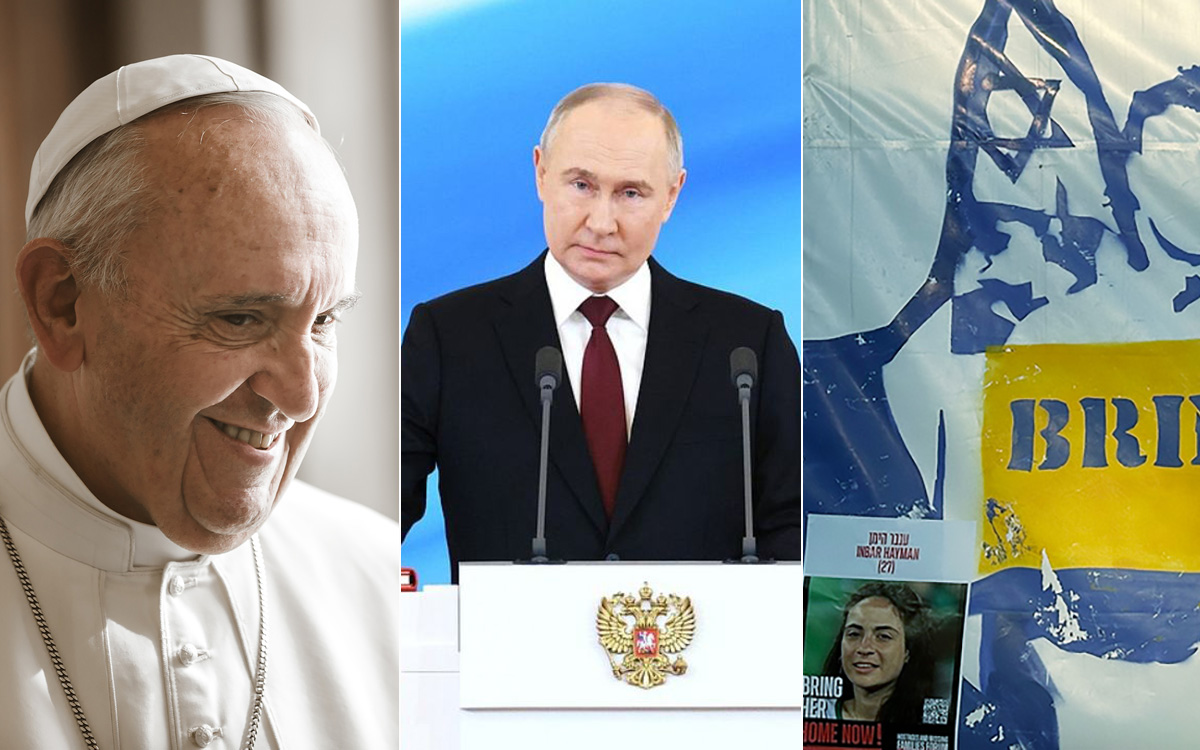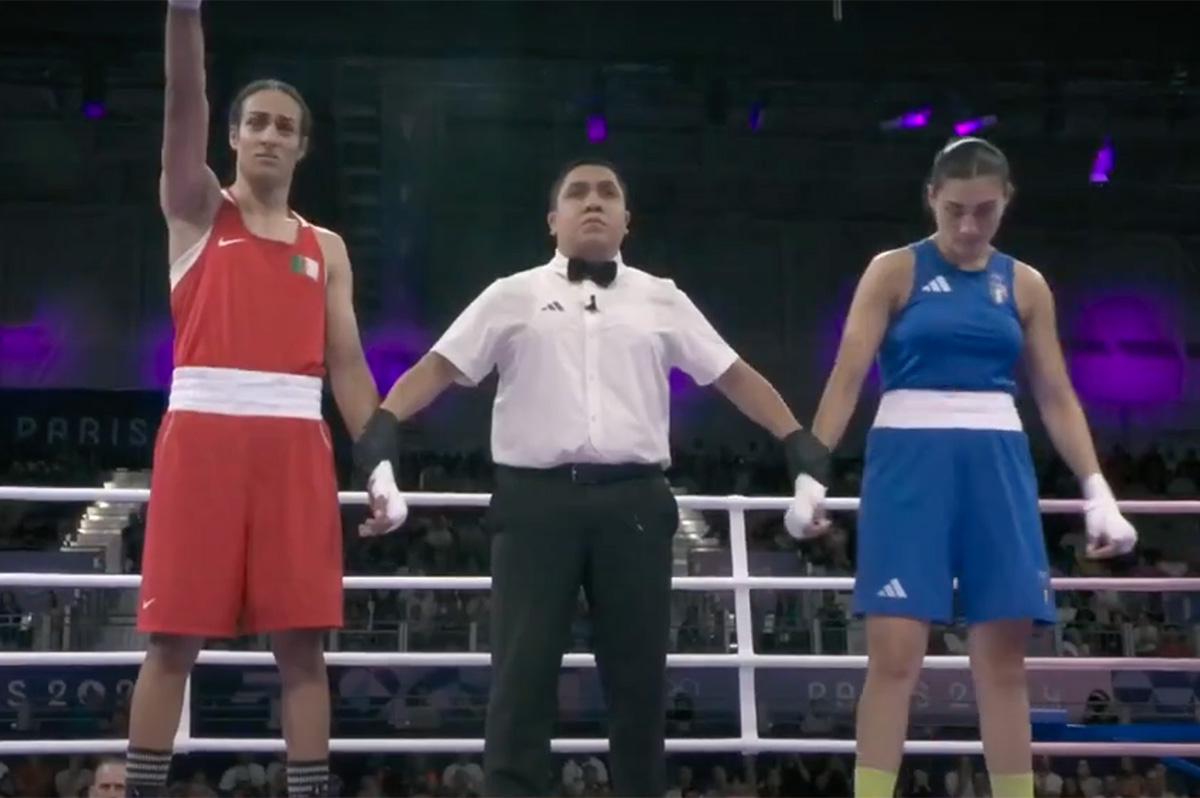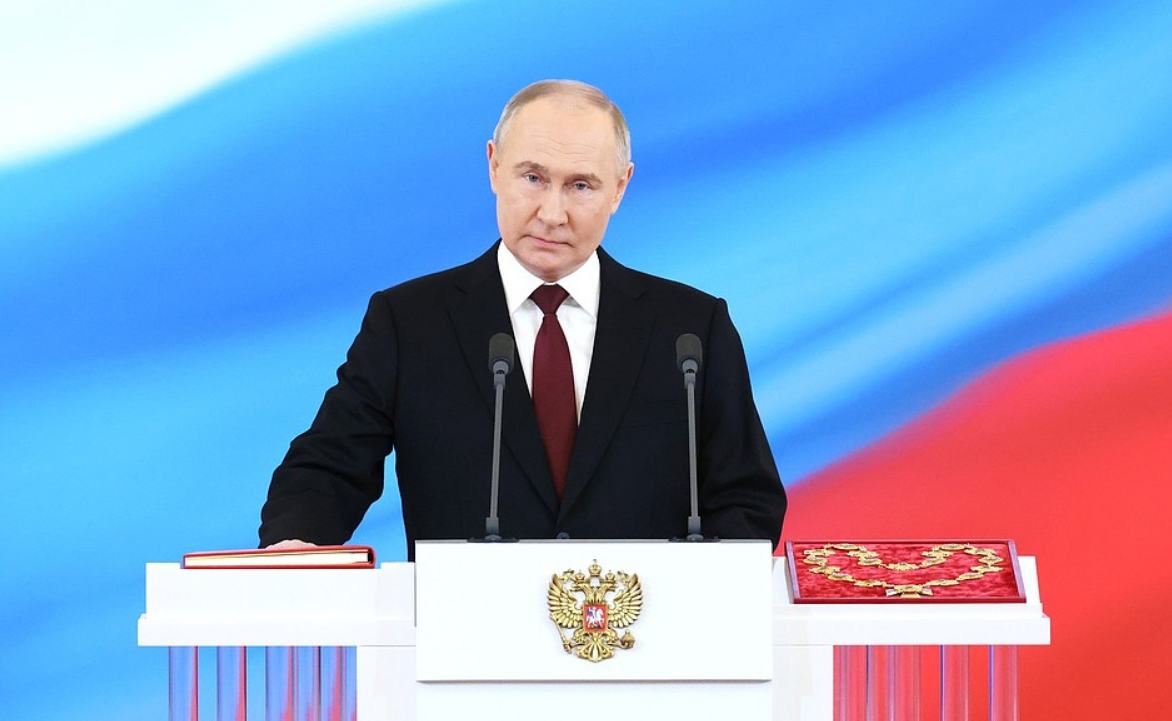World
Top 10 international LGBTQ news stories of 2024
Pope reaches out, Oct. 7 aftermath, Trump rattles activists

The extension of marriage rights to same-sex couples, anti-LGBTQ crackdowns, war, and elections are among the issues that made headlines around the world over the past year. Here are the top international stories of 2024.
#10 African countries move to criminalize homosexuality
Ghanaian MPs on Feb. 28 passed the Promotion of Proper Human Sexual Rights and Ghanaian Family Values Bill that would, among other things, criminalize allyship. Outgoing President Nana Akufo-Addo did not immediately sign the bill, citing the outcome of a Supreme Court case.
Burkina Faso Justice Minister Edasso Bayala on July 10 announced consensual same-sex sexual acts are illegal in the country. Mali’s Transitional National Council on Oct. 31 adopted a draft penal code that would criminalize acts of homosexuality.
The Dominica High Court of Justice, on the other hand, on April 22 struck down provisions of a law that criminalized consensual same-sex sexual relations in the Caribbean nation. A judge on St. Vincent and the Grenadines’s top court on Feb. 16 dismissed two cases that challenged the country’s sodomy laws.
#9 More countries extend marriage rights to same-sex couples
Greece, Liechtenstein, and Estonia in 2024 extended marriage rights to same-sex couples.
Thai King Maha Vajiralongkorn on Sept. 24 approved a marriage equality bill that lawmakers passed earlier in the year. It is slated to take effect on Jan. 22, 2025. Liechtenstein’s marriage equality law will take effect on New Year’s Day.
The Dutch Supreme Court on July 12 ruled Aruba and Curaçao must extend marriage rights to same-sex couples. Czech lawmakers in February rejected a marriage equality bill.
#8 Gay, lesbian lawmakers make headlines
Steve Letsike, a lesbian who founded Access Chapter 2, a South African advocacy group, on May 29 won a seat in the South African National Assembly. President Cyril Ramaphosa later named her to his Cabinet.
French President Emmanuel Macron on Jan. 9 named Gabriel Attal as the country’s first openly gay prime minister. Attal resigned in July after Macron’s party lost its overall majority in the National Assembly.
Then-Irish Prime Minister Leo Varadkar on March 20 announced his resignation. He became the country’s first gay prime minister in 2017.

#7 Algerian boxer Imane Khelif faces questions over gender at Olympics
Algerian boxer Imane Khelif faced questions over her gender during the 2024 Paris Olympics.
Khelif won the Olympic gold medal in the women’s 66-kilogram competition on Aug. 10. She was born female and does not identify as transgender or intersex. The International Olympic Committee said Khelif “is not a man fighting a woman.”
Khelif after the games filed a criminal complaint against JK Rowling and Elon Musk with French authorities. The lawsuit claims the two engaged in “acts of aggravated cyber harassment.”

#6 Mexico bans ‘conversion therapy’
The Mexican Senate on April 25 overwhelmingly approved a bill that bans so-called conversion therapy in the country.
The measure passed by a 77-4 vote margin with 15 abstentions. The Chamber of Deputies, the lower house of Mexico’s congress, in March approved the bill that, among other things, would subject conversion therapy practitioners to between two and six years in prison and fines.
Canada, Brazil, Belgium, Germany, France, and New Zealand are among the countries that ban conversion therapy.
#5 Germany’s Self-Determination Act takes effect
A German law that simplifies the process for transgender or nonbinary people to legally change their name and gender in official documents took effect on Nov. 1.
The country’s Cabinet on Aug. 21 approved the Gender Self-Determination Act.
#4 Russia’s anti-LGBTQ crackdown continues
The Russian government in 2024 continued its anti-LGBTQ crackdown.
President Vladimir Putin last month signed a bill that bans the adoption of Russian children in countries where gender transition is legal.
Media reports indicate authorities on Nov. 30 raided three Moscow nightclubs that have hosted LGBTQ-specific events. Authorities in October raided two bars in the Russian capital and in Yekaterinburg. The raids coincided with National Coming Out Day events.

#3 Pope Francis continues outreach to LGBTQ Catholics
Pope Francis in 2024 continued his outreach to LGBTQ Catholics.
The pontiff on Oct. 12 met with a group of transgender and intersex Catholics and LGBTQ allies at the Vatican. Sister Jeannine Gramick, co-founders of New Ways Ministry, a Maryland-based organization that advocates on behalf of LGBTQ Catholics, arranged the meeting that took place at Casa Santa Marta, Francis’s residence in Vatican City.
Clare Byarugaba of Chapter Four Uganda and Rightify Ghana Director Ebenezer Peegah met with Francis at the Vatican on Aug. 14.
Francis earlier this year during an interview with CBS Evening News anchor Norah O’Donnell said priests can bless gays and lesbians who are couples, as opposed to their unions. Francis in a declaration the Vatican’s Dicastery for the Doctrine of the Faith released on March 25 condemned gender-affirming surgeries and “gender theory.”

#2 LGBTQ Israelis, Palestinians grapple with Oct. 7 aftermath
The Washington Blade traveled to Israel in October to cover the first anniversary of Oct. 7 and how LGBTQ Israelis and Palestinians continue to grapple with its aftermath.
Jerusalem Open House for Pride and Tolerance, Pride House of Be’er Sheva, the Aguda, the Israeli Transgender Association, and other Israeli advocacy groups continue to offer access to mental health services, housing programs, and other needs to those directly impacted by Oct. 7.
The Blade interviewed Omer Ohana, who successfully lobbied Israeli lawmakers to amend the country’s Bereaved Families Law to recognize LGBTQ widows and widowers of fallen Israel Defense Forces soldiers. Hamas militants on Oct. 8, 2023, killed his fiancé, IDF Maj. Sagi Golan, in a kibbutz near the Gaza Strip.
LGBTQ aid workers who have worked with queer Palestinians in Gaza over the last year also spoke with the Blade.
“It became very apparent to me that everything we did was like pouring water into the desert,” said Rain Doe Dubilewski of Safebow, which helped more than 300 people evacuate Gaza. “There was nothing we can offer that is lasting or stable for the Palestinian people.”

#1 Trump re-election sparks concern among LGBTQ activists around the world
President-elect Donald Trump’s election in November sparked concern among LGBTQ activists and advocacy groups around the world.
“I worry that Trump’s win means no protection for global LGBTQ+ human rights,” Sexual Minorities Uganda Executive Director Frank Mugisha told the Blade.
Esteban Paulón, a long-time LGBTQ activist in Argentina who won a seat in the country’s Congress in 2022, echoed Mugisha. Outright International Executive Director Maria Sjödin in an email to their group’s supporters after the election said the results “have raised deep concerns for many of us who care about fundamental human rights, freedoms, and democratic norms for LGBTIQ people and everyone else around the world.”
Trump during his first administration tapped then-U.S. Ambassador to Germany Richard Grenell to lead an initiative that encouraged countries to decriminalize consensual same-sex sexual relations. Activists with whom the Blade has previously spoken questioned whether this effort had any tangible results.

South Africa National Assembly Speaker Thoko Didiza on June 17 swore in lesbian feminist Palomino Jama as a new MP.
Jama joins other LGBTQ legislators — including Public Works and Infrastructure Minister Dean Macpherson; Forestry, Fisheries and the Environment Minister Dion George; and Deputy Women, Youth, and Persons with Disabilities Minister, Steve Letsike.
Jama said she will work hard and excel as MP.
“What a great moment to be alive. Thank you youth of 1976, thank you Simon Nkoli, Phumi Mthetwa, Paddy Nhlaphos, Vanessa Ludwig, and others for what you did for the LGBTI people in the 80s and 90s. Lastly, for the fierce fist of the Jamas to always hit where it matters for the people of this country,” said Letsike.
Embrace Diversity Movement, a local LGBTQ organization, said Jama’s inauguration came at an appropriate time, during Pride month.
“Her swearing-in took place during a month of profound significance in June, which marks both international Pride Month and Youth Month in South Africa,” said the group. “Palomino is a seasoned queer activist and dedicated community builder with a distinguished record of leadership and service.”
“The EDM proudly supports Palomino in her deployment to parliament, her presence meaningfully advances youth and queer representation in public office,” added the Embrace Diversity Movement. “We are confident that she will serve the people of South Africa with integrity, courage, and distinction.”
South Africa is the only African country that constitutionally upholds LGBTQ rights. There are, however, still myriad challenges the LGBTQ community faces on a daily basis that range from physical attacks to online abuse.
Letsike in May faced a barrage of online attacks after she released a scathing statement against popular podcaster Macgyver “MacG” Mukwevho, who during a podcast episode in April insinuated that the reason behind popular socialite Minnie Dlamini’s “unsuccessful” relationships were probably due to the bad odor from her genitals.
Letsike, who viewed MacG’s comments as offensive, called for the podcaster to be summoned before parliament’s Portfolio Committee on Women, Youth, and Persons with Disabilities and criticized the local television station that aired the podcast.
X users and other social media subscribers bombarded Letsike with anti-lesbian comments. She, however, was unphased.
Letsike continues to face anti-lesbian comments, even though MacG apologized and the television station on which his podcast had aired cancelled its contract with him.
Israel
Activist recalls experience in Tel Aviv after Israel-Iran war began
Marty Rouse was part of Jewish Federations of North America Pride mission

A long-time activist who was in Israel last month when its war with Iran began has returned to D.C.
Marty Rouse traveled to Israel on June 6 with the Jewish Federations of North America. The 5-day mission ended the night before the annual Tel Aviv Pride parade was scheduled to take place.
Mission participants met with Israeli President Isaac Herzog and several LGBTQ activists in Tel Aviv and Jerusalem. They visited the Western Wall, the Nova Music Festival site, and Nir Oz, a kibbutz in southern Israel that is less than a mile from the country’s border with the Gaza Strip. Mission participants also visited Sderot, a city that is roughly a mile from the Hamas-controlled enclave, a veterans rehabilitation facility, a new LGBTQ health center and the Aguda: The Association for LGBTQ Equality in Israel in Tel Aviv.
Hamas militants on Oct. 7, 2023, killed upwards of 360 partygoers and kidnapped dozens more at the music festival that was taking place at a campground near Re’im, a kibbutz that is roughly 10 miles southwest of Nir Oz. The militants killed or took hostage nearly a quarter of Nir Oz’s residents. They also took control of Sderot’s police station.

Tel Aviv Deputy Mayor Chen Arieli spoke at the mission’s closing party that took place at the Sheraton Grand, a hotel that overlooks Tel Aviv’s beachfront, on June 12.
Rouse and other mission participants planned to stay in Tel Aviv for the Pride parade, which was scheduled to take place the following day. He and Gordie Nathan, another mission participant who lives in Palm Springs, Calif., had checked into a nearby hotel that was less expensive.
“We said our farewells,” recalled Rouse when he spoke with the Washington Blade in D.C. on June 24. “We went to our hotels, and we get the warning, and then all hell broke loose.”
Israel early on June 13 launched airstrikes against Iran that targeted the country’s nuclear and military facilities.
Rouse said mission organizers told him and other participants who remained in Tel Aviv to meet at the Sheraton Grand for breakfast and dinner — Israel’s airspace was closed in anticipation of an Iranian counterattack, and authorities cancelled the Pride parade.
He said he went to bomb shelters at least twice a night for three nights.
Israel’s Home Front Command during the war typically issued warnings about 10 minutes ahead of an anticipated Iranian missile attack. Sirens then sounded 90 seconds before an expected strike.
Rouse and Nathan walked to the Sheraton Grand on June 13 when the Home Front Command issued a 10-minute warning. They reached the hotel in a couple of minutes, and staff directed them to the bomb shelter.
“You know to walk slowly, everything’s fine,” recalled Rouse. “You get 10 minutes, so everything was fine when the alarm goes off.”
Rouse described the Sheraton Grand shelter as “well lit” with WiFi, a television, and air conditioning. He was watching an Israeli television station’s live coverage of the Iranian missile attack when he saw one hit an apartment building in the Tel Aviv suburb of Ramat Gan.
A 74-year-old woman died and her boyfriend was seriously injured.
“I go over to look at the TV, just to watch,” recalled Rouse. “All of a sudden, you watch, and you see one bomb go and land and explode in Tel Aviv on TV. It landed and blew up.”
“I was like, okay, this is real, and so that was scary,” he added.
Rouse said the bomb shelter in the hotel where he and Nathan were staying after the mission ended was far less comfortable.
“It was dark. It was humid. It was hot. It was very uncomfortable,” said Rouse. “You really felt alone.”

Rouse and nearly everyone else on the mission who were in Tel Aviv when the war began left Israel on June 15. They boarded buses that took them to the Jordanian capital of Amman, which is a roughly 2 1/2-hour drive from Tel Aviv through the West Bank.
Rouse described the trip as “like a field trip” until they drove across the Jordan River and arrived at the Jordanian border crossing.
“You walk into this room, and instead of being in a well air-conditioned airport, you’re in this hot, humid, small place in the middle of the desert, packed with people, and those big, large, loud fans and pictures of military people on the walls,” he said. “It was almost like a Casablanca kind of feeling.”
Rouse said Jordanian authorities brought mission participants through customs in groups of 10. A Jewish Federations of North America liaison from Amman who previously worked as a tour guide for A Wider Bridge — a group that “advocates for justice, counters LGBTQphobia, and fights antisemitism and other forms of hatred” — went “behind closed doors” to ensure everyone was able to enter the country.
“It took a really long time,” Rouse told the Blade.

Mission participants arrived in Amman a short time later. They checked into their hotel and then had dinner at a restaurant.
“Now we feel like we’re safe and we’re in Amman,” recalled Rouse. “We’re sitting outside having a beautiful dinner.”
Iranian missiles passed over Amman shortly after Rouse and the other mission participants had begun to eat their dessert. They went inside the restaurant, and waited a few minutes before they boarded busses that brought them back to their hotel.
“No one was openly freaking out, which I was surprised by,” said Rouse.
The group was scheduled to fly from Amman to Cairo at 11 p.m. local time (4 p.m. ET) on June 16. They visited Jerash, an ancient city north of Amman, before their flight left Jordan.
“[The Jerash trip] actually took our minds off of everything,” said Rouse.
A Jewish Federations of North America contact met Rouse and the other mission participants at Cairo’s airport once their flight landed. Rouse arrived at JFK Airport in New York on June 17.
Trump-announced ceasefire ended 12-day war
President Donald Trump on June 23 announced a ceasefire that ended the 12-day war.
The U.S. three days earlier launched airstrikes that struck three Iranian nuclear sites. The ceasefire took effect hours after Iran launched missiles at a U.S. military base in Qatar.
Iran said the war killed more than 900 people in the country.
The Associated Press notes Iranian missiles killed 28 people in Israel. One of them destroyed Tel Aviv’s last gay bar on June 16.
The war took place less than two years after Oct. 7.
The Israeli government says Hamas militants on Oct. 7, 2023, killed roughly 1,200 people on that day when it launched its surprise attack on the country. The militants also kidnapped more than 200 people.
The Hamas-controlled Gaza Health Ministry says Israeli forces have killed nearly 55,000 people in the enclave since Oct. 7. Karim Khan, the International Criminal Court’s chief prosecutor, has said Israeli Prime Minister Benjamin Netanyahu and former Hamas leader Yahya Sinwar, who the IDF killed last October, are among those who have committed war crimes and crimes against humanity in Gaza and Israel.

Rouse upon his return to the U.S. said he “was never as aware of the comfort of another human being than I was during that time.” Rouse affectionately called Nathan his “bomb shelter boyfriend” and even questioned the way he reacted to the missile alerts.
“He’s sitting on the edge of the bed and he goes, okay, I’m going to put on my socks and my shoes, and I say, really? You’re going to put on your socks,” Rouse told the Blade. “The fact that I was nervous, that putting on socks might have changed the direction of our lives, to me was like I can’t believe I said that to him.”
Rouse quickly added Nathan helped him remain calm.
“If I was by myself, those nights would have been long enough,” said Rouse. “It’s a totally different feeling to be with another human that you know than to be by yourself.”

Rouse also praised the Jewish Federations of North America.
“JFNA really sprung into action and started to figure out all options to get us all safely home,” said Rouse. “It was all about logistics. Staff worked around the clock identifying and then mobilizing to get us back to the states. It was a great team effort and I know I speak for everyone in expressing our deep appreciation for their dedication to getting us safely home.”
Latin America
Protests, demands for rights define Pride month in Latin America
More than 3 million people participated in São Paulo march

Activists across Latin America marked Pride month with massive demonstrations, cultural activities, and demands that their countries guarantee equality and protect LGBTQ people from violence.
From Santiago, Chile, to Mexico City, activists took to the streets to celebrate the rights that have been won and the many that are still pending.
Chile
The Pride march that the Movement for Homosexual Integration and Liberation (Movilh) and Fundación Iguales organized took place in downtown Santiago, the country’s capital, on June 22. Authorities and the two organizations say more than 120,000 people participated.
Under the slogan “Pride with memory and hope,” marchers demanded lawmakers approve a bill that would allow reparations for LGBTQ Chileans who Gen. Augusto Pinochet’s dictatorship targeted. There were also calls for the government to promote an LGBTQ-inclusive educational reform.
“This time we are marching on high alert,” said Movilh spokesperson Javiera Zúñiga. “For the first time in decades, we are losing achieved rights. We demand the state wake up. The reform of the Zamudio Law has been stalled for 13 years.”
Marches also took place in Valparaíso, Antofagasta, Temuco, and Concepción, highlighting the growing visibility of transgender groups and feminist organizations.
Mexico
Mexico City on June 29 was the epicenter of one of the region’s largest Pride marches.
More than 300,000 people participated in the march. Comité IncluyeT organized the 46th annual march under the slogan “Not one step back: rights are respected.”
Several organizations denounced the increase in hate crimes — Mexico’s National Observatory of Hate Crimes notes more than 80 LGBTQ people have been reported murdered in the last year. They also urged Mexican lawmakers to criminalize transfeminicides across the country.
Argentina
Although Buenos Aires’s official Pride march takes place in November, the Argentine LGBT+ Federation and other groups in the Argentine capital and in other cities across the country in June organized activities.
More than 5,000 people on June 24 marched from Plaza de Mayo to the Argentine Congress to reject the government’s dismantling of public policies. President Javier Milei’s decision to eliminate the country’s Women, Gender, and Diversity Ministry and cut sexual health programs were among the moves the protesters denounced.
“Today Pride is also resistance to the adjustment,” pointed out Comunidad Homosexual Argentina, an LGBTQ advocacy group.

Colombia
Thousands of people in Bogotá, the Colombian capital, and the cities of Medellín, Cali, and Barranquilla marched on June 29.
The marchers’ slogan was “diversity is also peace,” in a context where violence against LGBTQ people remains high. Caribe Afirmativo, a Colombian LGBTQ rights group, notes more than 45 people from the community has been reported killed in the country over the last 12 months, with most of them trans women.
Organizations also demanded lawmakers resume debate of a bill that would extend comprehensive protections to LGBTQ Colombians. The measure has been stalled in Congress since 2023.
Brazil
More than 3 million people participated in the 28th São Paulo LGBTQ+ Pride Parade that took place on the city’s Paulista Avenue on June 22.
The parade took place under the slogan “LGBT+ social policies: we want the whole thing, not half of it.” Organizers demanded expanded access to health care, employment, and education for the most vulnerable communities, especially Black trans people. They also denounced ultraconservative figures who seek to curtail LGBTQ rights.
Peru and Paraguay
More than 15,000 people took part in a Pride march in Lima, the Peruvian capital, on June 28. Participants demanded lawmakers approve a trans rights law, which has been stalled in the Peruvian Congress since 2016, and recognition of civil unions.
Members of SomosGay, a Paraguayan LGBTQ rights group, and other organizations participated in a Pride march that took place in Asunción, the country’s capital, on June 29.
The march took place without incident, despite threats and anti-LGBTQ hate speech on social media. Participants demanded an end to anti-LGBTQ discrimination and rhetoric from social and religious groups.
Central America
Upwards of 2,000 people participated in a Pride march in Tegucigalpa, the Honduran capital, on June 22. A Pride demonstration took place in San Salvador, the capital of neighboring El Salvador, on June 28.
-

 U.S. Supreme Court4 days ago
U.S. Supreme Court4 days agoSupreme Court to consider bans on trans athletes in school sports
-

 Out & About4 days ago
Out & About4 days agoCelebrate the Fourth of July the gay way!
-

 Virginia4 days ago
Virginia4 days agoVa. court allows conversion therapy despite law banning it
-

 Opinions5 days ago
Opinions5 days agoCan we still celebrate Fourth of July this year?










